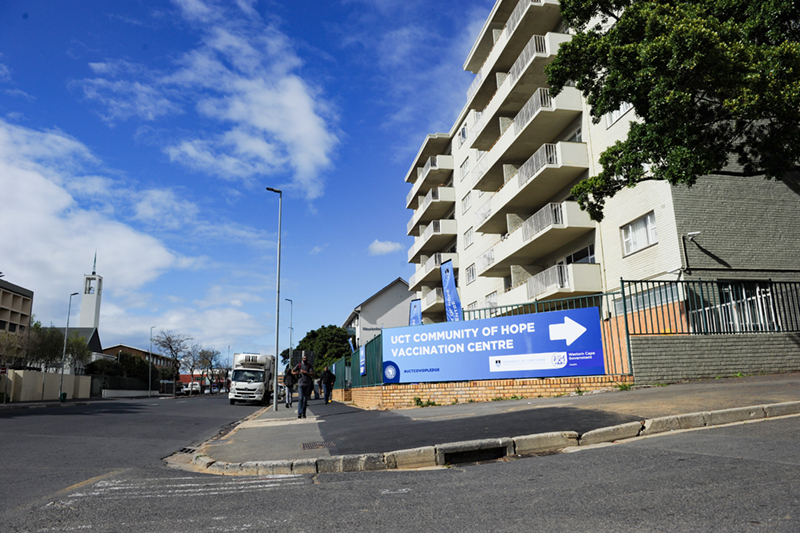Decrease hospital admissions with COVID-19 vaccinations
28 September 2021 | Story Supplied. Photo Lerato Maduna. Read time 3 min.
The University of Cape Town’s (UCT) Global Surgery Division has undertaken to put its weight behind and call for an uptake in vaccinations to help fight COVID-19. The call to vaccinate coincided with a symposium hosted by the division on 18 September 2021, themed, “Navigating Surgical Recovery during the COVID-19 pandemic”.
The division’s statement was undersigned by Associate Professor Salome Maswime (the head of the Global Surgery Division), Dr Tracey Adams (Department of Obstetrics and Gynaecology), Dr Nisha Jacob (Department of Public Health and Family Medicine), Associate Professor Lydia Cairncross (Department of Surgery) and Dr Rowan Duys (Department of Anaesthesia and Perioperative Medicine).
Their statement follows below.
“We encourage the public to engage and to find platforms and reliable sources of information led by qualified experts.”
The COVID-19 pandemic has continued to disrupt essential healthcare and access to surgical care across the world. The pandemic has resulted in massive surgical backlogs, delays in cancer screening and increased maternal mortality in South Africa. We envision a world where everyone has access to comprehensive, quality surgical care.
In the past, through vaccines, smallpox was eradicated, polio was eliminated, and measles were controlled. We can control severe expression of the SARS-CoV-2 virus through vaccination.
We therefore support and encourage vaccinations to prevent severe COVID-19 disease and thus to decrease hospital admissions. Evidence has clearly shown that vaccinated people have less chance of hospital admissions and death.
All women are encouraged to have the vaccination during pregnancy (with informed consent). In addition, all cancer patients are also encouraged to vaccinate, ideally pre-treatment, to prevent treatment delays. We also support routine COVID-19 screening and vaccination prior to elective surgery.
Vaccination prevents hospital admissions and will free up hospital beds. Currently, elective surgical lists have been repeatedly postponed as human resources are required to care for COVID-19-positive patients.
We are looking forward to a time when a hospital surgical recovery plan can be commenced so that all have access to essential healthcare.
We encourage the public to engage and to find platforms and reliable sources of information led by qualified experts.
We support our physicians in the fight against COVID-19, and we salute every healthcare worker for their contribution.
 This work is licensed under a Creative Commons Attribution-NoDerivatives 4.0 International License.
This work is licensed under a Creative Commons Attribution-NoDerivatives 4.0 International License.
Please view the republishing articles page for more information.
UCT’s response to COVID-19
COVID-19 is a global pandemic that caused President Cyril Ramaphosa to declare a national disaster in South Africa on 15 March 2020 and to implement a national lockdown from 26 March 2020. UCT is taking the threat of infection in our university community extremely seriously, and this page will be updated with the latest COVID-19 information. Please note that the information on this page is subject to change depending on current lockdown regulations.
Minister of Health, Dr Joe Phaahla, has in June 2022 repealed some of South Africa’s remaining COVID-19 regulations: namely, sections 16A, 16B and 16C of the Regulations Relating to the Surveillance and the Control of Notifiable Medical Conditions under the National Health Act. We are now no longer required to wear masks or limit gatherings. Venue restrictions and checks for travellers coming into South Africa have now also been removed.
Read the latest document available on the UCT policies web page.
Campus communications
2022
UCT Community of Hope Vaccination Centre
On Wednesday, 20 July, staff from the University of Cape Town’s (UCT) Faculty of Health Sciences came together with representatives from the Western Cape Government at the UCT Community of Hope Vaccination Centre at Forest Hill Residence to acknowledge the centre’s significance in the fight against COVID-19 and to thank its staff for their contributions. The centre opened on 1 September 2021 with the aim of providing quality vaccination services to UCT staff, students and the nearby communities, as well as to create an opportunity for medical students from the Faculty of Health Sciences to gain practical public health skills. The vaccination centre ceased operations on Friday, 29 July 2022.
With the closure of the UCT Community of Hope Vaccination Centre, if you still require access to a COVID-19 vaccination site please visit the CovidComms SA website to find an alternative.
“After almost a year of operation, the University of Cape Town’s (UCT) Community of Hope Vaccination Centre, located at the Forest Hill residence complex in Mowbray, will close on Friday, 29 July 2022. I am extremely grateful and proud of all staff, students and everyone involved in this important project.”
– Vice-Chancellor Prof Mamokgethi PhakengWith the closure of the UCT Community of Hope Vaccination Centre, if you still require access to a COVID-19 vaccination site please visit the CovidComms SA website to find an alternative.
Frequently asked questions
Global Citizen Asks: Are COVID-19 Vaccines Safe & Effective?
UCT’s Institute of Infectious Disease and Molecular Medicine (IDM) collaborated with Global Citizen, speaking to trusted experts to dispel vaccine misinformation.
If you have further questions about the COVID-19 vaccine check out the FAQ produced by the Desmond Tutu Health Foundation (DTHF). The DTHF has developed a dedicated chat function where you can ask your vaccine-related questions on the bottom right hand corner of the website.
IDM YouTube channel | IDM website
“As a contact university, we look forward to readjusting our undergraduate and postgraduate programmes in 2023 as the COVID-19 regulations have been repealed.”
– Prof Harsha Kathard, Acting Deputy Vice-Chancellor: Teaching and Learning
We are continuing to monitor the situation and we will be updating the UCT community regularly – as and when there are further updates. If you are concerned or need more information, students can contact the Student Wellness Service on 021 650 5620 or 021 650 1271 (after hours), while staff can contact 021 650 5685.




















